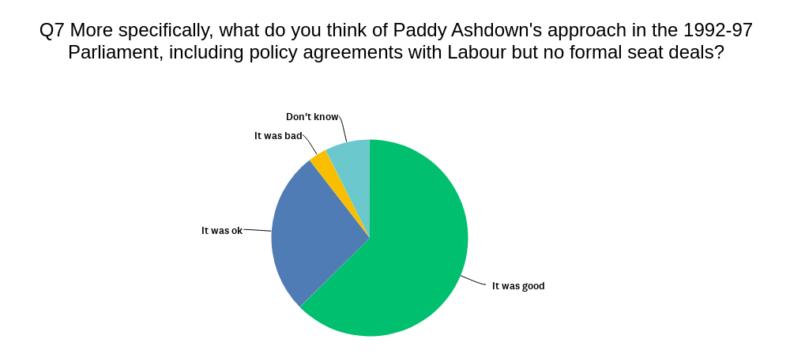Strong support from party members for Paddy Ashdown’s political strategy
Many thanks to everyone who has taken part in my latest mini-survey. As I always emphasise when talking about the results from previous editions, it’s the equivalent of chatting to lots of people in the queue for coffee at Liberal Democrat events. A quick dip into views rather than a statistically rigorous analysis, in other words.
This time around, the skew of participants was heavily towards longer-standing party members. Interestingly, though, the answers did not vary much between newer and longer-standing members. Both groups very strongly put the party as being closer to Labour than the Conservatives, for example.
Not much variation except in one, counter-intuitive, respect. Generally, newer members said they knew more about events from the party’s history than longer-standing members. Perhaps that’s a quirk of the sampling. Or perhaps newer members include more people who have recently studied modern British politics at school, college or university? Whatever the reason, it’s a good reminder not to stereotype people based on their age or party experience.
There is one answer, in particular, I wanted to pull out due to its relevance to discussions all through the party this year: attitudes towards Paddy Ashdown’s political strategy in the 1990s.
His approach generated much controversy at the time, but the results in the 1997 general election have given it a very warm afterglow:

(Of course, the answers would have been much less positive if I’d asked ‘… including flirting with the idea of merging with Labour’. But that’s not relevant to this Parliament.)
You can hear more about that strategy, why it worked and the lessons for this Parliament in The Project: How the Conservatives were beaten last time.
Listen to the Liberal Democrats and British politics being discussed by myself and a wide range of experts from inside and outside the party on my podcast, Never Mind The Bar Charts.
I have Paddy Ashdown’s diaries from this period. He was never that keen on a merger. It was Blair who kept suggesting it.
I really think we need to go back to the drawing board – at around 6% of Vote in recent Voting Intention Polls this is about the very existence of the Party.
I personally met Paddy on quite a number of occasions and the same with the amazing CK – we desperately need to get back to grass-roots campaigning if we are to survive at all. The resurgence of the Party with 63 Parliamentary Seats seems a world away …..We absolutely must also build up strength across the whole of UK – there are whole regions where the Party is completely invisible now ….
The G.E. report implied such, I think? Always being aware of how and why we achieved something is essential, even if it may take a while to understand. Certainly we achieved much under Paddy (as we did afterwards under Charles Kennedy). ‘The times’ and ‘events’ had much bearing of course, but why was Paddy’s strategy so successful during those times – and why was Charles’ strategy equally successful afterwards ?
I remember hammering the same few messages year after year. ” 1p on income tax for education ” lasted over two G.E.s didn’t it ?
When people think about or are asked about the Lib Dems they need to immediately know at least one policy area we keep pursuing – and being able to immediately identify leading Lib Dems, if only our current Leader. Those policy areas need to have us stand out from other Parties, because they are areas which affect people and about which they care.
Council vs General elections is a frustrating study. Why did we turn some areas of council control into MP seats and others not ?!
How we promoted Leaders on the doorstep for years mattered.
And, thinking about Paddy in particular, it is always worth re-reading his book “Beyond Westminster”. Even for many MPs most life happens elsewhere. Certainly it does for the voters.